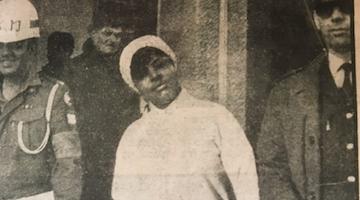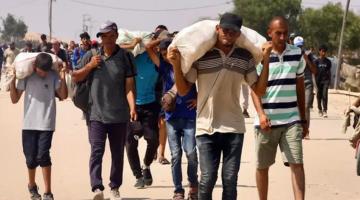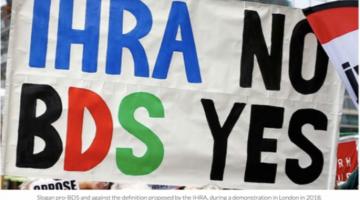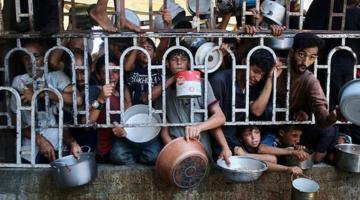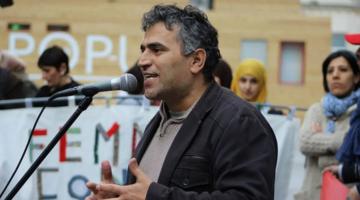Dan Kovalik’s new book makes a case for Palestine.
By December 29th last year, UNICEF reported that 1000 Gazan children had undergone amputations without anesthesia. This is one of the horrifying details that Dan Kovalik has collected in his new book The Case for Palestine, Why It Matters and Why You Should Care. For those who’ve been glued to the news, video, and images coming out of Gaza since last October 7, this will read like a stream of everything we’ve seen and heard with historical context and many grim milestones like that about child amputees.
“The war,” he notes, “is now into its 153rd day as I write these, the final words I will be able to write before The Case for Palestine goes to print. I fear that by the time this book is published, the more appropriate title may be, The Eulogy for Palestine. I pray this is not the case.”
It’s obvious that many Israelis would like to see Gazans tortured into the Sinai and dispersed far and wide. A Palestinian Facebook friend of mine recently made it across the Rafah Crossing with shrapnel in his body, saying that he just wanted to be “anywhere but Gaza,” and I’m sure that is not an uncommon sentiment. Who wouldn’t want to flee the bombing, rubble, filth, poisoned water, untreated sewage, famine, thirst, disease, and tragedy, all of which Kovalik describes in detail? How much longer will Gazans want to stay, possibly to face amputation without anesthesia or to watch their children suffer the same as so many already have? Regarding one of his trips to Gaza, Max Blumethal said, “There are amputees everywhere.”
President Joe Biden could end the horror of all this tomorrow, but he hasn’t and there’s no sign he will. Instead he has quietly worked to lift restrictions on weapons transfers to Israel.
A Short History of Zionism
“A Short History of Zionism and the Founding of Israel in Historic Palestine,” the first chapter of The Case for Palestine, makes it clear that Israel has been an ethno-fascist project from the beginning, strangely and uneasily paired with the Christian evangelism that sees the Jewish state as a prelude to “some imagined apocalyptic future in which the ‘righteous’ are taken to Heaven while the ‘unrighteous’ are damned and die in an eternal fire.” In the US, Christians for Israel now claim 10 million members, which would mean that they outnumber the entire American Jewish population.
A parallel motive, at the time of the infamous 1917 Balfour Declaration was, Kovalik writes, “strategic imperial interest to keep Egypt and the Suez Canal within Britain’s sphere of influence.” This imperial interest has been sustained and expanded since the US assumed primary sponsorship of Israel in 1967. It now includes the drive to build a canal parallel to the Suez and control oil and gas reserves. “A major interest the United States, and other Western nations, have in the current conflict is the major natural gas reserves recently discovered off the Mediterranean coast of Gaza,” Kovalik writes. “And Hamas and the Palestinian people themselves are huge obstacles to control over these reserves.”
He quotes the Canada Files, which cites the US Geological Survey, writing:
“the Levant Basin Province contains ‘a mean of 1.7 billion barrels of recoverable oil and a mean of 122 trillion cubic feet of recoverable gas.’ The northern end of the Levant Basin lies near the Syrian port of Tartus, runs down the coastlines of Lebanon, Israel, and the Gaza Strip (part of the occupied Palestinian territory), and west towards Cyprus. This means that the Eastern Mediterranean will be one of the most important areas in the world for the production of natural gas over the decades to come, which is why Israel chose to attack and seal off Gaza [in 2007] in order to steal, extract and sell natural gas which belongs to the Palestinians.”
Genocide in the West Bank
In “Genocide in the West Bank,” Chapter 5 of The Case for Palestine, Kovalik details Israel’s lesser known crimes in this part of Palestine. “Hamas is not the governing party in the West Bank and has little influence there,” he writes. “And yet, this has not spared the West Bank from the escalation of violence by Israel against the people there since October 7. This is further evidence, I would submit, of Israel’s genocidal intent. That is, as far as Israel is concerned, the problem with the people in the West Bank is the same with the people in Gaza—it’s because they are Palestinian; not because they are associated with Hamas. Or, in the words of my friend Fadia Barghouti from the West Bank: ‘It is not our resistance that they oppose; it is our existence.’”
The word “genocide” has been used to justify US/EU/NATO aggression, most notably that in Libya and Syria, but, Kovalik argues that it rightly applies in the case of Palestine. “As a human rights lawyer with more than three decades of experience in the field, I know well that the concept of genocide has often been subject to political abuse. But the current wholesale slaughter of the Palestinian people, rooted in an ethno-nationalist settler colonial ideology, in continuation of decades of their systematic persecution and purging, based entirely upon their status as Arabs, and coupled with explicit statements of intent by leaders in the Israeli government and military, leaves no room for doubt or debate.”
Persecution of the Christian Church
In Chapter 6, “The United States, Israel, and the Modern-Day Persecution of the Christian Church,” Kovalik explains that Palestinian Christian communities—in the historic cradle of Christianity—were among the first targets of the Israeli settler colonial state and continue to be to this day.
He situates their persecution in the context of the US and Israel’s attacks on liberation theology and Israel’s long history of collaboration with Latin American fascist governments.
The Case for Palestine
In his final chapter, “Conclusion: The Case for Palestine,” Kovalik details Hamas’s “eminently reasonable” but little reported ceasefire counterproposal to Israel’s, which Biden calls “over the top.”
He prays that the war will be over by the time his book is released, but rightly sees little chance that that will be the case and writes that whether it is or not, “Gaza and the people still living there will be in utter misery, with virtually no civilian infra-structure left—no functioning hospitals, no universities, and just a few schools,” and that “the IDF is surgically dismantling the entire civilian architecture of Gaza in a nihilistic and unprecedented act of violence.”
He also details the International Court of Justice’s preliminary ruling that Israel is “plausibly” guilty of genocide and that of the Northern District of California, which concluded that it did not have jurisdiction but wrote, “The undisputed evidence before this Court comports with the finding of the ICJ and indicates that the current treatment of the Palestinians in the Gaza Strip by the Israeli military may plausibly constitute a genocide.” It wrote further, “This Court implores Defendants [President Biden et al.], to examine the results of their unflagging support of the military siege against the Palestinians in Gaza.”
Displaying complete contempt for international law, Israel escalated attacks on the Gaza Strip after the ICJ ruling with US support. The US even cut funding to the United Nations Relief and Works Agency for Palestine Refugees in the Near East (UNRWA), the principal aid lifeline to Palestine.
“This occupation must end,” Kovalik concludes, “for Israel will not stop oppressing and killing the Palestinians until every Palestinian in historic Palestine is either ejected or dead.”
Dan Kovalik is an attorney practicing in Pittsburgh. 'The Case for Palestine, Why It Matters and Why You Should Care' is available from Skyhorse Publishing.
Ann Garrison is a Black Agenda Report Contributing Editor based in the San Francisco Bay Area. In 2014, she received the Victoire Ingabire Umuhoza Democracy and Peace Prize for her reporting on conflict in the African Great Lakes region. She can be reached at ann@anngarrison.com. You can help support her work on Patreon.




